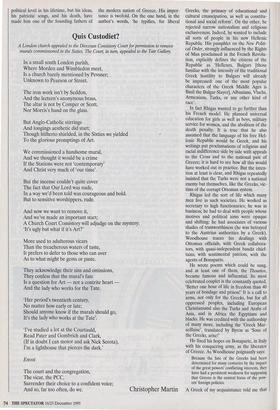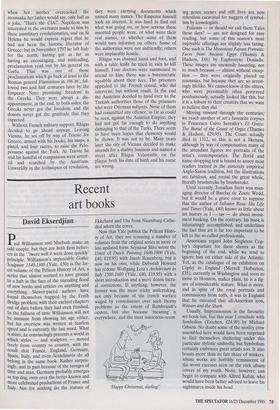political level in his lifetime, but his ideas, his patriotic
songs, and his death, have made him one of the founding fathers of the modern nation of Greece. His impor- tance is twofold. On the one hand, in the author's words, 'he typifies, for liberal Greeks, the primacy of educational and cultural emancipation, as well as constitu- tional and social reform'. On the other, he rejected narrow nationalism and religious exclusiveness. Indeed, he wanted to include all sorts of people in his new Hellenic Republic. His pamphlet on the New Politi- cal Order, strongly influenced by the Rights of Man proclaimed in the French Revolu- tion, explicitly defines the citizens of the Republic as `Hellenes, Bulgars [those familiar with the intensity of the traditional Greek hostility to Bulgars will already be impressed: one of the most popular characters of the Greek Middle Ages is Basil the Bulgar-Slayer], Albanians, Vlachs, Armenians, Turks, or any other kind of race'.
In fact Rhigas wanted to go further than his French model. He planned universal education for girls as well as boys, military service for women, and the abolition of the death penalty. It is true that he also assumed that the language of his free Hel- lenic Republic would be Greek, and his writings put proclamations of religious and racial indifference side by side with appeals to the Cross and to the national past of Greece; it is hard to see how all this would have worked out in practice. But the inten- tion at least is clear, and Rhigas repeatedly insisted that the Turks were not a national enemy but themselves, like the Greeks, vic- tims of the corrupt Ottoman system.
Rhigas led the sort of life which many men live in such societies. He worked as secretary to high functionaries; he was in business; he had to deal with people whose motives and political aims were opaque and shifting; he had associates of various shades of trustworthiness (he was betrayed to the Austrian authorities by a Greek). Woodhouse traces his dealings with Ottoman officials, with Greek collabora- tors, with quasi-independent bandit chief- tains, with sentimental patriots, with the agents of Bonaparte.
He wrote poems which could be sung, and at least one of them, the Thourios, became famous and influential. Its most celebrated couplet is the constantly quoted, `Better one hour of life in freedom than 40 years of bondage and prison!' It is a call to arms, not only for the Greeks, but for all oppressed peoples, including European Christiansand also the Turks and Arabs of Asia, and in Africa the Egyptians and blacks. He was credited with the authorship of many more, including the 'Greek Mar- seillaise', translated by Byron as 'Sons of the Greeks, arise!'
He fixed his hopes on Bonaparte, in Italy with his conquering army, as the liberator of Greece. As Woodhouse poignantly says: Because the fate of the Greeks had been determined for many centuries by the impact of the great powers' conflicting interests, they have had a persistent weakness for supposing that Greece is the central focus of the pow- ers' foreign policies.
A Greek of my acquaintance told me that when her mother overcooked the moussaka her father would say, only half as a joke, 'That's the CIA!'. Napoleon was interested in the overtures made to him by these unmilitary revolutionaries, and on St Helena he would express regret that he had not been the historic liberator of Greece; but in November 1797 he left Italy for the north, having got as far as having an encouraging, and misleading, proclamation read out by his general on Corfu. That was one of those proclamations which go back at least to the Roman general Flamininus in 196 BC, fol- lowed two and half centuries later by the Emperor Nero promising freedom to the Greeks. They were always a dis- appointment, in the end, to both sides: the Greeks never got the freedom, and the donors never got the gratitude that they expected. Without French military support, Rhigas decided to go ahead anyway. Leaving Vienna, he set off by way of Trieste for Greece, armed with his books, his maps, a pistol, and four razors, to raise the Pelo- ponnese against the Turk. At Trieste he and his handful of companions were arrest- ed and searched by the Austrians. Unworldly in the techniques of revolution, they were carrying documents which named many names. The Emperor himself took an interest. It was hard to find out what was going on, or how serious these assorted people were, or what were their real names, or whether some of them would turn informer on others. Some of the authorities were not unfriendly; others were implacably hostile.
Rhigas was chained hand and foot, and with a table knife he tried in vain to kill himself. Four doctors were summoned to attend to him; there was a bureaucratic squabble about their fees. The prisoners appealed to the French consul, who did intervene, but without result. In the end the Austrians decided to hand over to the Turkish authorities those of the prisoners who were Ottoman subjects. None of them had committed any offence, as far as could be seen, against the Austrian Empire; they had not got far enough to do anything damaging to that of the Turks. There seem to have been hopes that clemency would be shown. It was not to be. Many years later the city of Vienna decided to make amends for a shabby business and named a street after Rhigas Velestinlis; on the plaque both his date of birth and his name are wrong.











































































































 Previous page
Previous page